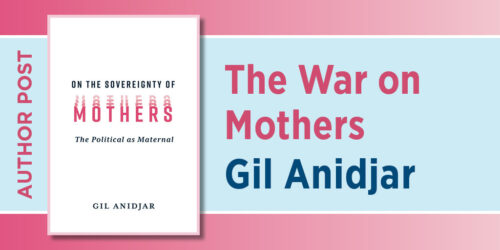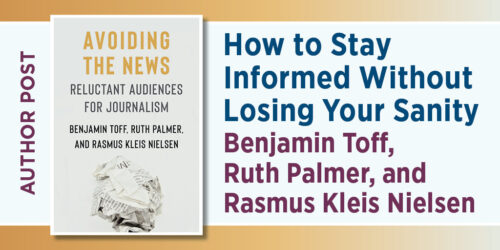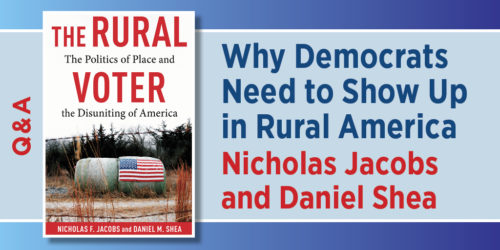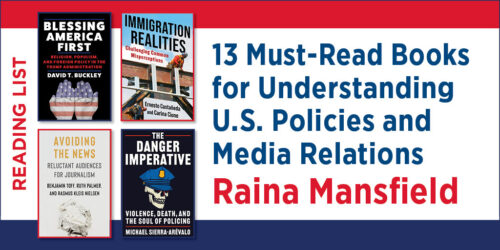David T. Buckley on Blessing America First
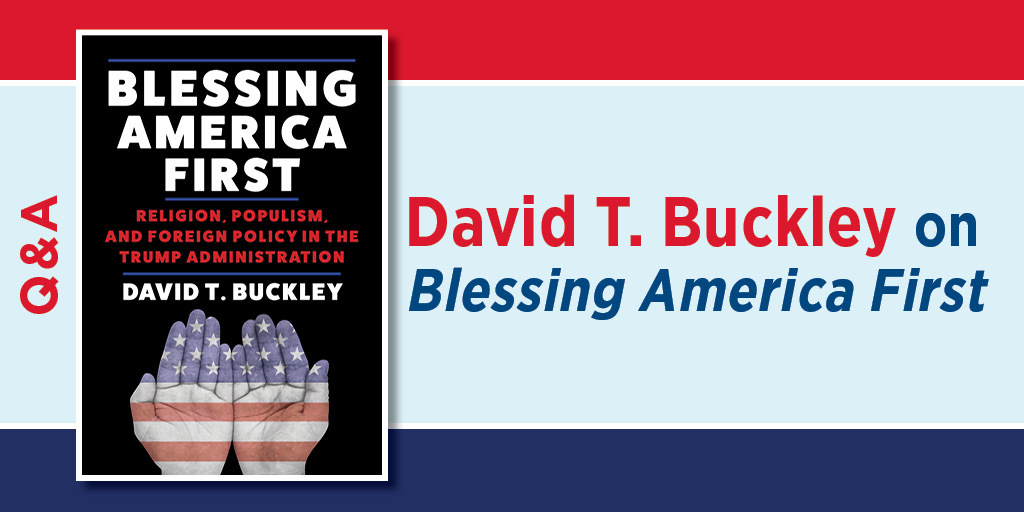
In the lead-up to the 2024 U.S. presidential election, Donald Trump’s presidential legacy continues to shape U.S. foreign policy. David T. Buckley argues that the Trump administration’s populist approach transformed religion from a tool of statecraft into a strategy of political control. As voters consider our country’s future in global affairs, Blessing America First: Religion, Populism, and Foreign Policy in the Trump Administration offers broader lessons for understanding the relationship between religion and democracy under populist rule.
Q: How did you wind up working in President Trump’s State Department in early 2017?
David T. Buckley: By accident. I was a junior political science professor with expertise in religion and democracy, and I applied for a Council on Foreign Relations fellowship to work in the State Department in late 2015. I took up a position in the Secretary’s Office of Religion and Global Affairs (RGA), an office created by then Secretary of State John Kerry to advise State Department officials on how religion impacts U.S. foreign policy goals. That fellowship covered the 2016–2017 academic year, which put me in a fairly unusual position to observe the Trump administration’s approach to religion and foreign policy firsthand.
Q: Before we get to the Trump administration, what was religion like at the State Department before Trump’s election?
Buckley: By mid-2016, staff in RGA would sometimes joke that they were making religion in diplomacy boring. “Boring” meant two things. First, the policy issues RGA worked on were diverse, not just hot-button issues like Middle East peace plans that you might associate with religion. Bread-and-butter diplomatic goals like combatting corruption and strengthening environmental diplomacy have as much to do with religion in many parts of the world as topics associated with the “culture wars” in the United States.
Second, “boring” referred to the everyday work of the average diplomat, not just splashy meetings with high-profile religious leaders like Pope Francis. One of RGA’s goals was to make it a normal part of a diplomat’s day to consider how religion might or might not impact the policy issue in their inbox, just like they would consider the economic and security aspects of that issue. Sometimes RGA leaders would talk about putting themselves out of business, in a good sense, when the average U.S. diplomat didn’t need special advising on religion.
Q: There has been a lot written about Christian nationalism and Trump’s support of it. How did that factor into foreign policy?
Buckley: I argue in Blessing America First that, as a populist, Trump focused on defining “the people” and demonizing outsiders. Foreign policy was an underappreciated way that he went about this, and Christian nationalism played a part in that. One of the first Trump administration officials to arrive at the State Department after the inauguration previously served as a leader of the Trump campaign’s Evangelical Advisory Board. Even steps like moving the U.S. Embassy in Israel to Jerusalem were heavily geared toward an American evangelical audience, with the Trump-supporting pastor Robert Jeffress appearing at the dedication ceremony. I also argue that domestic Christian nationalism promoted ties to Christian nationalists abroad, including in Russia. Vice President Mike Pence met privately with the Russian Orthodox Church’s cleric responsible for foreign affairs in the first months of 2017. These relationships have outlived Trump to an extent, with Christian nationalists keeping close ties to Hungary’s Viktor Orbán, for example.
But it’s important to remember that populists are not true ideological believers in anything but their personal power. When international religious freedom advocates, for instance, raised an outcry about abuses of Christians in India, Secretary of State Mike Pompeo, often seen as a religious freedom devotee, downplayed concerns and praised Indian prime minister Narendra Modi’s leadership. Trump and Modi had a warm relationship, and this took precedence over other concerns. I think we’ve seen this ideological opportunism at work in Trump’s latest campaign, as he has forced language into the GOP platform that downplays opposition to abortion.
Q: What else did “populism” mean for religion and foreign policy, beyond Christian nationalism?
Buckley: Populists don’t just rail against outsiders. They also reject limitations on their personal power and care a lot more about personal connections than bureaucratic processes. It was telling when White House Press Secretary Sarah Huckabee Sanders told a reporter that “an office doesn’t determine the faith of an administration.… We probably have, actually, more people, front and center, speaking openly about their faith.” This was a real break from recent Republican and Democratic officials who had worked to build up religion within the foreign policy bureaucracy over the past quarter century or so.
This helps to explain what happened to RGA during the transition. It could have been staffed with true-believing Christian nationalists, but it wasn’t. It also wasn’t attacked directly, which did happen with some USAID officials who attempted to limit the Trump administration’s assistance to churches. Instead, RGA more or less withered away. Existing staff moved on to their next postings and weren’t replaced. When I left the office in the summer of 2017, RGA’s staff size had dropped from around thirty to roughly a half-dozen. Trump advisors argued that it was more important that prayer sessions were taking place in the White House.
Q: How did the “deep state” really respond to the Trump presidency?
Buckley: I argue in Blessing America First that I simply did not observe a “deep state” of career national security officials conspiring to undermine the Trump presidency. Strong cultural norms of nonpartisan service work against that, and there are practical obstacles like frequent rotations of career officials into new positions as well.
Does this mean that career staff jumped on board with all of Trump’s foreign policy priorities? Not at all. However, objections tended to follow established procedures, or to end up with individuals leaving government service. The “Muslim Bans” are a great example of this that touched on RGA’s work. Staff throughout the State Department objected to the proposed executive orders related to refugee resettlement and visa access in early 2017. They were bad policy in terms of U.S. national interest and ran counter to American values. The immediate career staff response was to file a “dissent channel” cable signed by roughly a thousand officials. The dissent channel isn’t deep state resistance, though; it is a part of the official, internal diplomatic process, stretching back to the Vietnam War. Leaking the document to the media was outside of typical practice, but conspiracies about the deep state are usually about more than just media leaks.
Q: You write that religion in diplomacy has an “ambiguous future.” Did the Biden administration take steps to undue Trump’s religious populism in foreign policy?
Buckley: Yes, but moreso by undoing some of the most egregious damage than by reconstructing old bureaucratic infrastructure. Rescinding the Muslim Bans was one of Joe Biden’s first executive actions in office. Melissa Rogers, an experienced White House attorney, returned to government service to coordinate religious engagement efforts across executive branch agencies. USAID continued the important (if seemingly unending) process of updating guidance on religion and U.S. foreign assistance.
However, RGA did not return to its previous staffing capacity or status within the State Department bureaucracy. The Biden State Department was incredibly busy with crises from Kabul to Kiev to Israel and the Palestinian Territories, so this is understandable on a certain level. However, given Biden’s personal comfort with religion, it does seem like a missed opportunity. Original survey data in my book shows that Democrats have responded to Trump’s religious populism by becoming even more critical of religion in politics. Future Democratic leadership could be even more skeptical of religion’s involvement in diplomacy.
Q: We’re obviously in the middle of a presidential election, and this time Trump’s support among white Christians is well-established. Do you expect religion and foreign policy to play a part on the campaign trail?
Buckley: After the last six weeks, making predictions about this election seem like a dangerous business. I expect border security to remain an obsession of the Trump campaign, and that certainly touches on elements of foreign policy. Some religious voices, for instance, criticized Trump’s immigration policy while in office, but for many others it was another chance to “bless America First,” as I say in the book. J. D. Vance has ties to international networks of “post-liberal” Catholics that are deeply skeptical of what scholars call the “liberal international order,” from free trade to international organizations. On a more targeted basis, I’ll be curious to see if U.S. policy on Venezuela and Cuba plays into Trump’s outreach to Hispanics and Latinos, especially evangelicals in those communities.

